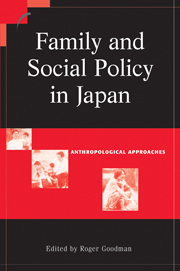Book contents
- Frontmatter
- Contents
- List of Illustrations
- Acknowledgements
- Contributors
- A note to the reader
- 1 Anthropology, policy and the study of Japan
- 2 Toward a cultural biography of civil society in Japan
- 3 Pinning hopes on angels: reflections from an aging Japan's urban landscape
- 4 Reproducing identity: maternal and child healthcare for foreigners in Japan
- 5 State, standardisation and ‘normal’ children: an anthropological study of a preschool
- 6 Child abuse in Japan: ‘discovery’ and the development of policy
- 7 Touching of the hearts: an overview of programmes to promote interaction between the generations in Japan
- 8 Death policies in Japan: the state, the family, and the individual
- 9 Embodiment, citizenship and social policy in contemporary Japan
- Index
3 - Pinning hopes on angels: reflections from an aging Japan's urban landscape
Published online by Cambridge University Press: 05 July 2014
- Frontmatter
- Contents
- List of Illustrations
- Acknowledgements
- Contributors
- A note to the reader
- 1 Anthropology, policy and the study of Japan
- 2 Toward a cultural biography of civil society in Japan
- 3 Pinning hopes on angels: reflections from an aging Japan's urban landscape
- 4 Reproducing identity: maternal and child healthcare for foreigners in Japan
- 5 State, standardisation and ‘normal’ children: an anthropological study of a preschool
- 6 Child abuse in Japan: ‘discovery’ and the development of policy
- 7 Touching of the hearts: an overview of programmes to promote interaction between the generations in Japan
- 8 Death policies in Japan: the state, the family, and the individual
- 9 Embodiment, citizenship and social policy in contemporary Japan
- Index
Summary
When I lived in Japan in the beginning of the 1990s, it seemed I could hardly open a newspaper without reading an article about the rapidly greying society and the economic toll this would take on Japan's citizens in the future. Much ink flowed in this discourse of the aging society as national policymakers and pundits struggled to determine who would care for the elderly in the future and how this would be paid for. Now, at the start of the twenty-first century, newspapers still give extensive coverage to the ‘aging society,’ but in the past few years, a new, complementary yet competing discourse has been added to Japan's population dynamic: the shōshika mondai, or ‘problem of a low-birthrate society.’ In fact, in recent years the two terms are often combined, as it has become recognised that the two are of a piece, in danger of being frayed as each side pulls in a tug of war over funding new programmes.
In this paper I seek to analyse the shōshika mondai by examining a range of public opinion from the media and scholarly publications as well as by discussing several programmes within the ‘Angel Plan,’ the governmental policy to address this ‘problem.’ Shore and Wright (1997: 7) note that policies both ‘codify social norms and values and articulate fundamental organising principles of society, [but] they also contain implicit (and sometimes explicit) models of society.’
- Type
- Chapter
- Information
- Family and Social Policy in JapanAnthropological Approaches, pp. 54 - 91Publisher: Cambridge University PressPrint publication year: 2002
- 32
- Cited by



